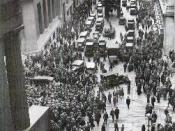Devil take the Hindmost (A history of financial speculation) - by Edward Chancellor
Jason Murdoch
This book discusses speculation and how it has shaped the western world. The book spans from the Romans to Modern day but in keeping with the theme of this course observations will be restricted to the pre 1900 section as much as possible. The book focuses on western economies as the Asian world considers the whole stock trading for profit as being ruinous to a healthy economy. Individual profit taking does not contribute to the wealth of the community. Oddly modern Japan is viewed as a western culture and its economic woes of the late 80s is a sign that that it fell afoul of the demons of western capitalistic greed. (my portfolio is like a quarter of its purchase cost so I am not a happy investor.)
The first modern capitalistic system was in ancient Rome.
Loans with interest, foreign exchange and bankers drafts were all in use. Shares in farms, tax gathering farms (1) and a form of maritime insurance. Then came along Christianity, made loans with interest a sin and allowed the Jews to corner the known worlds financial system. St Augustine put his tupence into the evil of gain. Judging by the posts in the previous section this saint has a lot to answer for. The darkness of the Dark Ages is probably the result of spreading of the light by the church.
It was 13th century Venice that resurrected the capitalistic system. The city government started selling off government securities (probably to fund the mercenaries it employed to protect itself). Laws were passed to stop insider trading and the depressing of security prices by rumour. Shares in the tax farms were again traded.
By the 15th century the great fairs...


